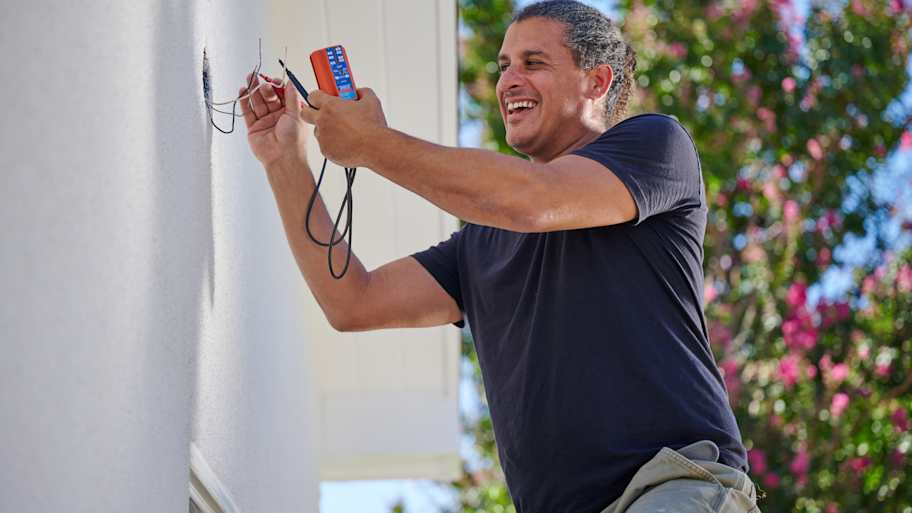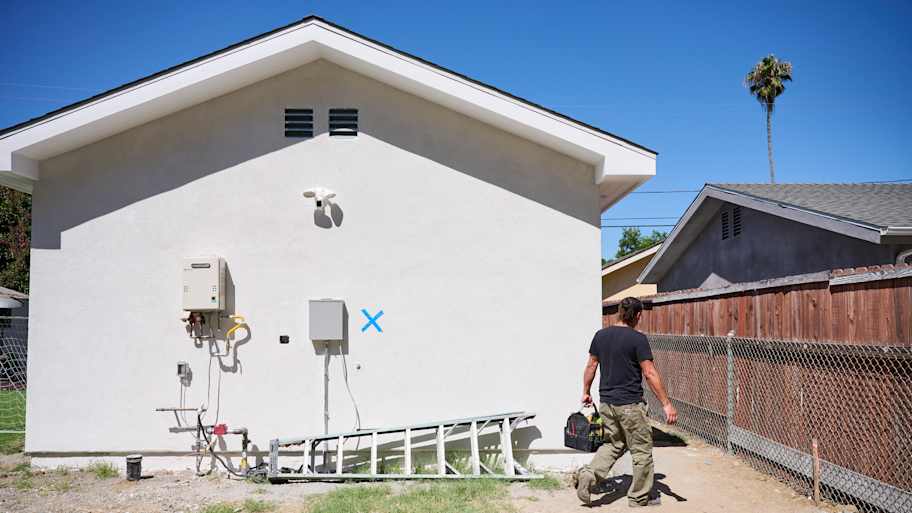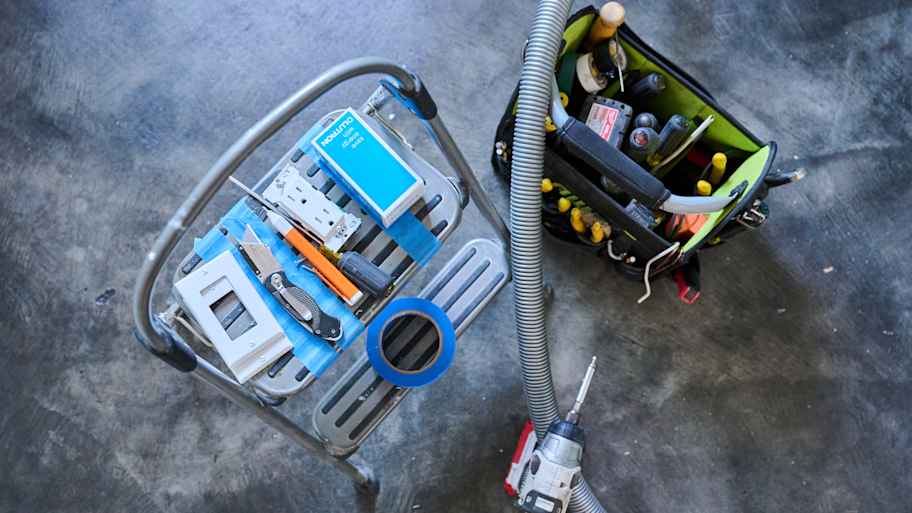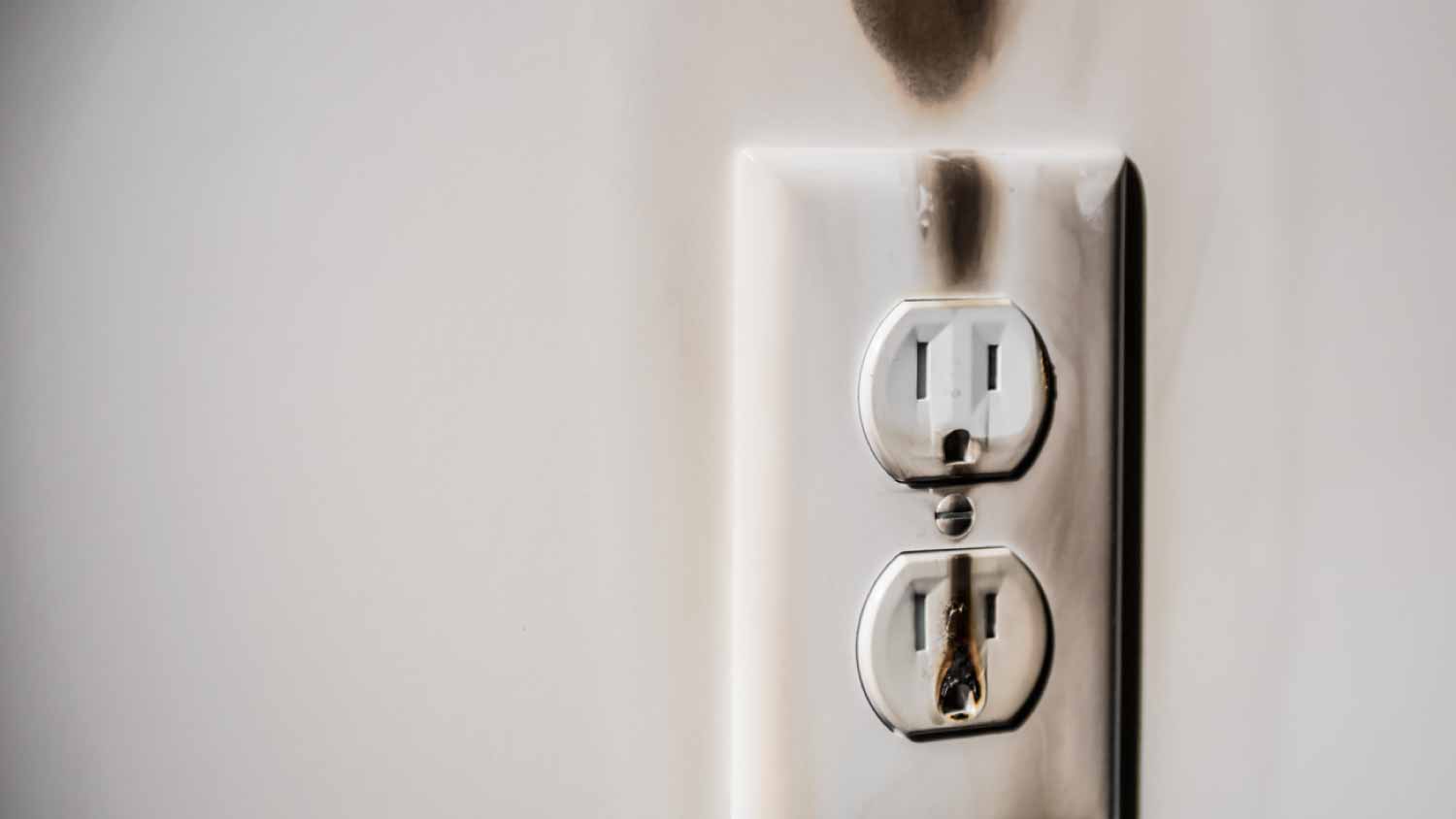How Much Does It Cost to Rewire a House? [2025 Data]
The cost to rewire a house can be between $602 and $2,593. Simple rewiring projects can be cheaper, but expect to pay $6,200 to rewire the entirety of an older, larger home.


You can loosely calculate the cost to rewire your home based on its size, considering the average price is $2 to $4 per square foot.
The age and condition of your home, as well as the type of existing wiring, will affect the final price.
Be sure to include the cost of permits, inspections, and fees to meet local safety codes.
Costs can also increase depending on the number of new outlets and whether you need to replace your electrical panel.
The cost to rewire a house is between $130 and $6,200 for a medium-sized house. The final cost is influenced by factors like the home's square footage, permit requirements, wiring accessibility, and the need for a new service panel. Let’s review how to budget for the cost of rewiring a house.
Rewiring Cost Calculator
Calculations are based on the average size of a home, which is about 2,500 square feet. Calculations rounded to the nearest whole number.
| Cost Calculator | Quantity | Cost Range |
|---|---|---|
| Rewiring Labor and Materials | 2,500 square feet | $5,000–$10,000 |
| Permit Costs | 1 electrical permit | $75–$150 |
| Post-Rewiring Inspection | 1 electrical inspection | $100–$125 |
| Optional: Install New outlet | 1 new outlet | $100–$185 |
| Total | $5,175–$10,275 | |
| Total per Square Foot | $2–$4 | |
| Total with Options | $5,275 | |
| Total per Square Foot with Options | $2.10–$4.20 |
Rewiring a House Cost Factors
The total cost to rewire a house depends on several factors, including the size of the home, the complexity of the work, and necessary upgrades like service panels. Understanding these factors can help you plan and budget for your project effectively.
Home Size
Rewiring a house is commonly priced per square foot. Including materials and labor, rewiring a house costs about $2 to $4 per square foot. Here’s an example of how the cost works out:
| House Size in Square Feet | Total Cost |
|---|---|
| 1000 | $2,000–$4,000 |
| 1,500 | $3,000–$6,000 |
| 2,000 | $4,000–$8,000 |
| 2,500 | $5,000–$10,000 |
| 3,000 | $6,000–$12,000 |
Age and Condition of Home
Older homes often have outdated or deteriorating wiring that doesn't meet modern safety standards, making rewiring an important project to prioritize. Homes with extensive wear and tear may also require additional repairs, such as replacing damaged conduits or upgrading outlets, which can increase the overall cost.
Project Scope
The size and complexity of the rewiring project play major roles in determining the cost. A simple update, such as replacing a few circuits, will cost less than a full-house rewiring, which involves running new wires, upgrading the electrical panel, and ensuring the system meets code requirements.
Accessibility
Wires that are hard to reach will take longer to access, adding time to your project. Since most pros charge between $50 to $100 an hour, walls that contain lath and plaster, brick, and studs and multiple levels with ceiling lighting can contribute to this price increase. Your breaker box location, circuitry, and existing wiring can also impact how accessible your wiring is to remove and replace.
Materials

The type and quantity of materials needed for the project will significantly impact your overall budget. Material budgets include wiring, outlets, switches, and possibly a new electrical panel. Higher-quality or specialty materials, such as fire-resistant wiring or smart home components, can increase costs but offer better durability and functionality.
| Wire Type | Cost per Linear Foot | Description |
|---|---|---|
| NM Cable | $0.40 to $0.80 | Consists of a current-carrying wire, a neutral wire, and a ground wire inside a protective plastic jacket or sheathing |
| UF Cable | $0.50 to $0.75 | Same as an NM cable, except it works underground or moist areas |
| THHN/THWN Wire | $0.80 to $1.60 | Used in unfinished spaces, like garages or basements, or for short exposed runs, like for hot water heaters or garbage disposals |
| Coaxial Cable | $0.25 to $0.35 | Less common; used for televisions and video equipment |
| Low-Voltage Wire | $0.25 to $0.35 | Circuits using less than 50 volts, like doorbell wires or thermostat wires |
Labor
You’ll need a local professional electrician for a rewiring project, which will run about $50 to $100 per hour, not including materials.
Permits, Inspections, and Safety Codes

Rewiring requires proper permits and inspections. If you are rewiring an old home, it needs to meet modern-day safety codes to protect your family from the risks of electrocution or fire.
Permits: The cost of permits will depend on your local regulations, but this typically costs $75 to $150 per permit.
Inspections: A preliminary inspection will uncover the work needed and a post-inspection will ensure a job well done. You’ll also want regular inspections every five to 10 years to ensure your electrical systems are working properly. Inspections are about $100 to $125 each.
Safety codes: Permits to ensure adherence to safety and building codes can be more expensive than standard permits. Expect to spend anywhere from $200 to $900 on permits for these special circumstances.
Prep and Cleanup
Your contractor will likely charge up to $500 for cleanup. Contractors will prep the worksite, but you’ll need to put in some elbow grease, including moving furniture, moving valuable items to protect them from damage, and clearing out the work area.
Additional Costs to Consider
Hidden expenses can quickly impact your budget, so it’s essential to plan for additional costs when rewiring your home. Beyond the standard labor and material expenses, factors such as wall repair, clean-up, and system upgrades can significantly influence the total cost to rewire a house.
| Additional Factors | Average Cost |
|---|---|
| Opening and repairing walls | $4–$8 per square foot |
| Upgrading wiring system | $200–$2,300 |
| Upgrading circuit breaker box | $700–$4,220 |
| Replacing electrical outlet | $125–$200 |
Rewire house: $200–$2,300
Upgrading circuit breaker box: $700–$4,220
Replacing electrical outlet: $125–$200
Additional Outlets and Switches
Rewiring is a perfect time to address your annoying lack of outlets. Ask your electrician to add outlets and switches for all of your lamps and electronics, then budget about $100 to $185 per outlet or switch.
New Electrical Service Panel
Older homes built in the 1940s and 1950s typically have 60-amp electrical service panels, which is hardly enough to handle the electrical loads from modern technology and devices. An electrician will need to install a new electrical service panel, typically 100 or 200 amps.
100 amps: A 100-amp electrical service panel can work for small homes and will cost $900 to $2,000.
200 amps: A 200-amp electrical service panel will work for most modern homes, and it will cost about $1,500 to $2,500 to install.
Knob and Tube Wiring Replacements
Houses built before 1950 likely have knob and tube wiring, which does not include a ground wire that helps release built-up electricity for safety. You’ll need to replace it to avoid knob and tube fire risk.
Permit: Permits to remove knob and tube wiring will cost $200 to $500.
Removal: Removing the knob and tube wiring will cost about $5,000.
Rewiring: After you’ve secured the permits and the knob and tube wiring has been removed, you’ll spend the standard $2 to $4 per square foot for rewiring.
How Much Does It Cost to Rewire a House Yourself?
Rewiring a house is incredibly dangerous to do yourself. If you have extensive electrical experience and knowledge; you’ll save on labor and spend only the cost of materials, about $0.25 to $1.60 per linear foot. Again, if you aren’t an experienced electrician, you should call one for rewiring projects rather than risking injury or even death to do it yourself.
It will take up to 10 days for experienced electricians to complete the work. You can make the electrician’s job go quicker by cleaning up the room, area, or house to give the electrician easy access to the electrical panel and wires within the walls.
How to Save on Home Rewiring Costs
Depending on the size of your home, rewiring can get very expensive. Here are a few tips to help you keep the costs down:
Compare prices: You don’t have to move forward with the first electrician you speak to. Get quotes from three or more professionals before you make a decision on who to hire.
Conduct an inspection: Having a professional check out the situation before you start any work can help you determine if you really need to rewire everything or if you can get by with repairs only.
Don’t open walls: Sometimes, an electrician can access your wiring through a crawlspace instead of tearing down walls. Keeping your walls intact will cut out the cost of repairing drywall or plaster.
Signs Your Home Needs Rewiring
Here are a few tips for identifying when it’s time to rewire your home to avoid nuisances like breaker trips and flickering lights.
Tripping circuit breaker: A telltale sign that your home needs rewiring is when you use multiple appliances in a single room only for the circuit breaker to trip.
Changes to outlets or switches: If you notice any yellowing, browned, or blackened appearances on these wiring parts, be sure to have a pro inspect it.
Home built before 1960: Homes built before the 1960s have plenty of charm, but you’ll also want to call a local electrician for an inspection if you’ve never rewired your home
Lights flicker frequently: It's a good idea to contact your electrical company to ask if there’s an intermittency issue. If that doesn’t resolve the problem, have an electrician look at your wiring to ensure no wires have come loose.
Burning smell: If your home smells like burnt toast, you should immediately turn off the breaker in the offending room. Leave the power off in that area until you can have an electrician investigate the source of the problem.
How Angi Gets Its Cost Data
Home is the most important place on earth, which is why Angi has helped more than 150 million homeowners transform their houses into homes they adore. To help homeowners with their next project, Angi provides readers with the most accurate cost data and upholds strict editorial standards. We’ve surveyed thousands of real Angi customers about their project costs to develop the pricing data you see, so you can make the best decisions for you and your home. We pair this data with research from reputable sources, including the U.S. Bureau of Labor Statistics, academic journals, market studies, and interviews with industry experts—all to ensure our prices reflect real-world projects.
Want to help us improve our cost data? Send us a recent project quote to costquotes@angi.com. Quotes and personal information will not be shared publicly.
Frequently Asked Questions
The average home needs rewired about every 25 years, although some wiring can last up to 40 years. Ultimately, insulation around the wire can wear down over time, leaving the wires vulnerable to degradation and creating fire hazards.
Plan for periodic electrical inspections every five to 10 years to ensure your wiring is safe.
Rewiring projects typically take three to 10 days. This process can be messy and dangerous, so you should plan to stay somewhere else during the project. Consult your local electrician about the estimated timeline of your specific project to understand how long it will likely take them to rewire your home.
Yes, it is possible to rewire a house without removing the drywall, but this doesn’t work in all homes. You can pull out old wires and insert new ones if you have access to the wiring system via the ceiling or through a crawl space. Some pros can also use a magnetic kit to fish the old wire out of the wall through a hole cavity and install the new wires. Just keep in mind that doing this is less stable than removing drywall, as you won’t be able to staple the wires into the framing.
Wiring can last anywhere from 50 to 70 years, but all kinds of mishaps can occur that reduce the lifespan of your electrical wiring, including severe weather conditions, pests, and even faulty wiring. Keeping a preventative maintenance scheduling and hiring an electrician for an annual electrical inspection will keep your wiring system around for as long as possible.





- Home Generator Repair
- Lamp Repair
- Electric Repair
- Generator Installation
- TV Antenna Services
- Emergency Electricians
- Commercial Electricians
- Attic Fan Installation
- Attic Fan Repair
- Exhaust Fan Installation
- Electric Inspectors
- Subcontractors
- Electrical Construction
- EV Charger Installer
- Chandelier Installation
- Doorbell Installation
- Bathroom Fan Installation
- Ring Installers
- Electrical Panel Upgrade











